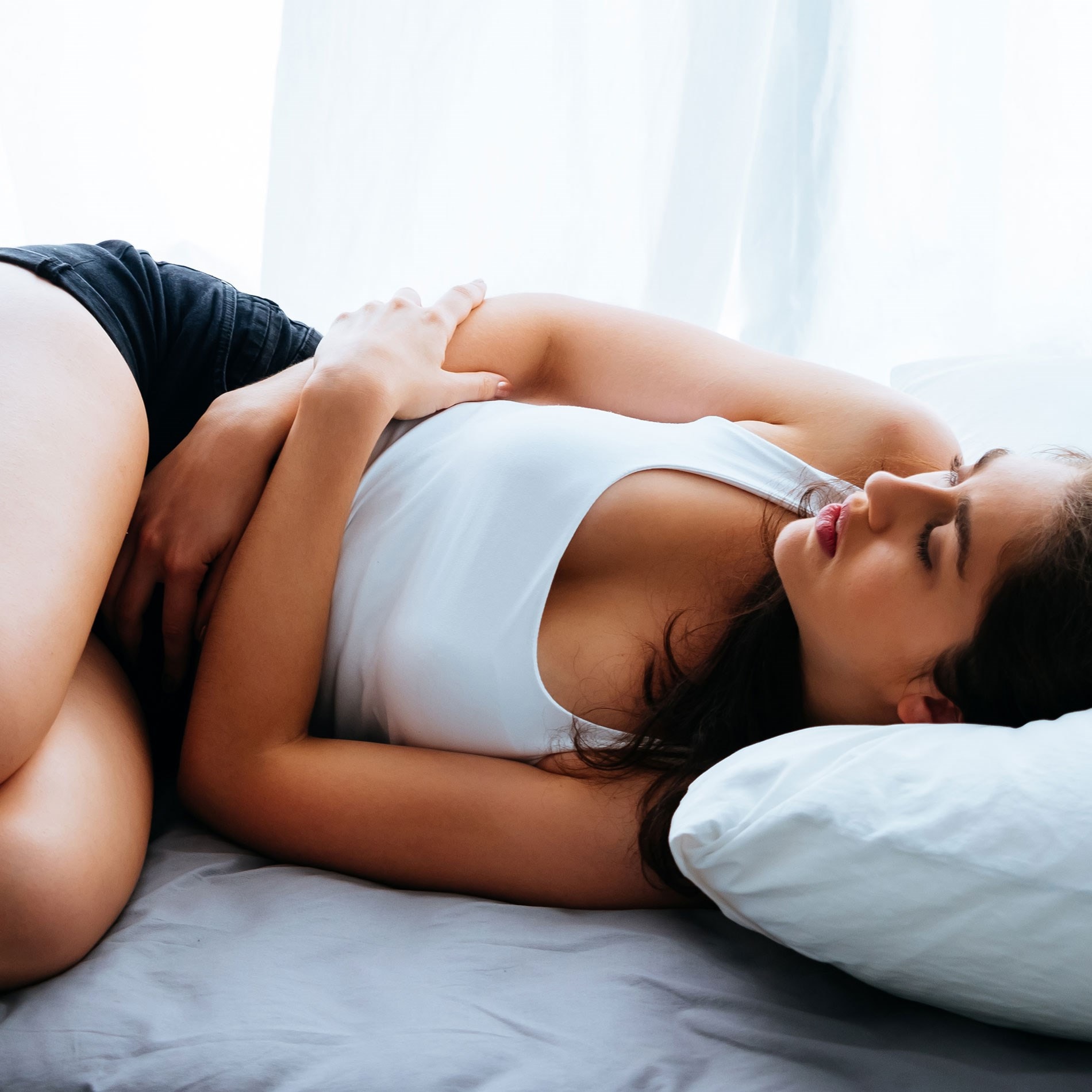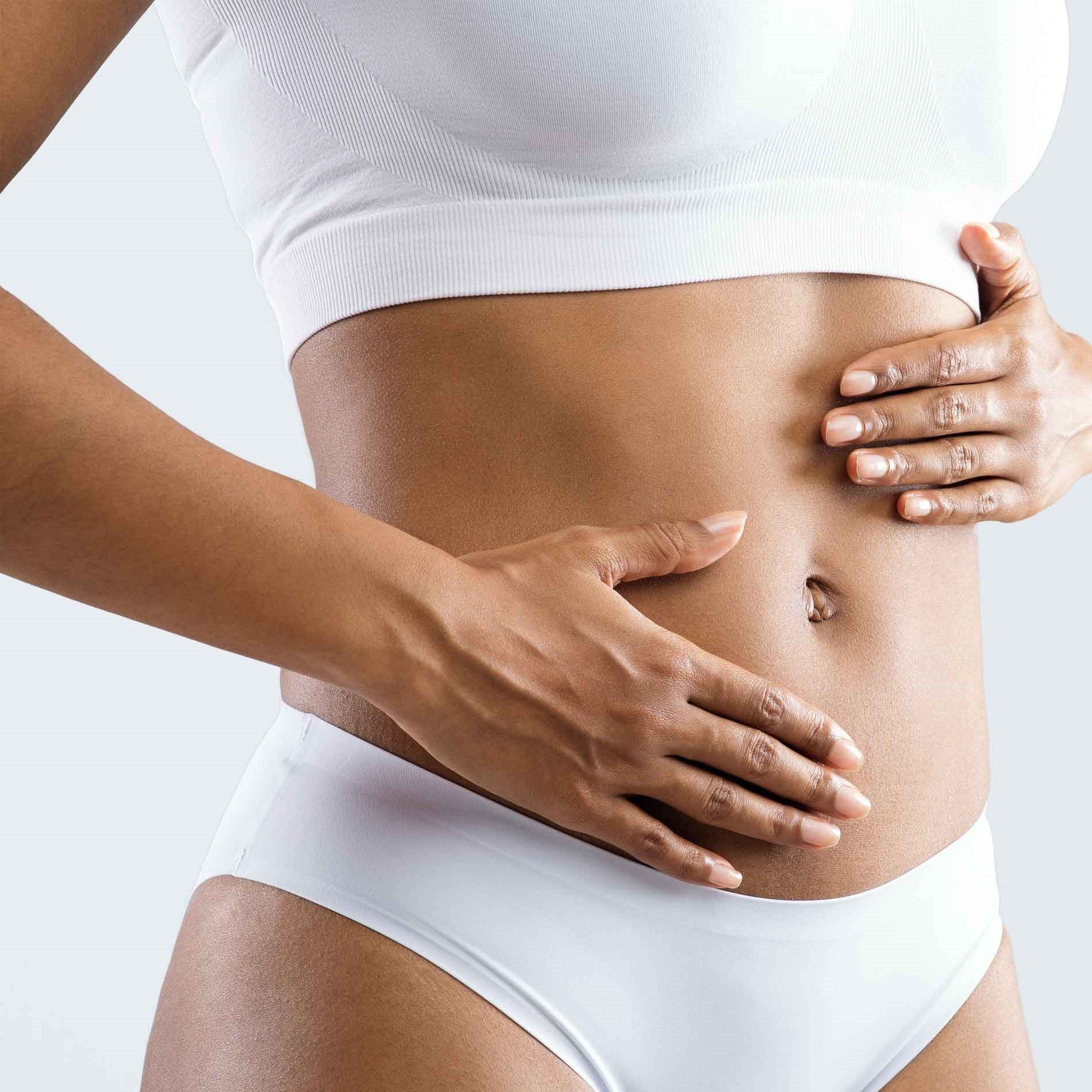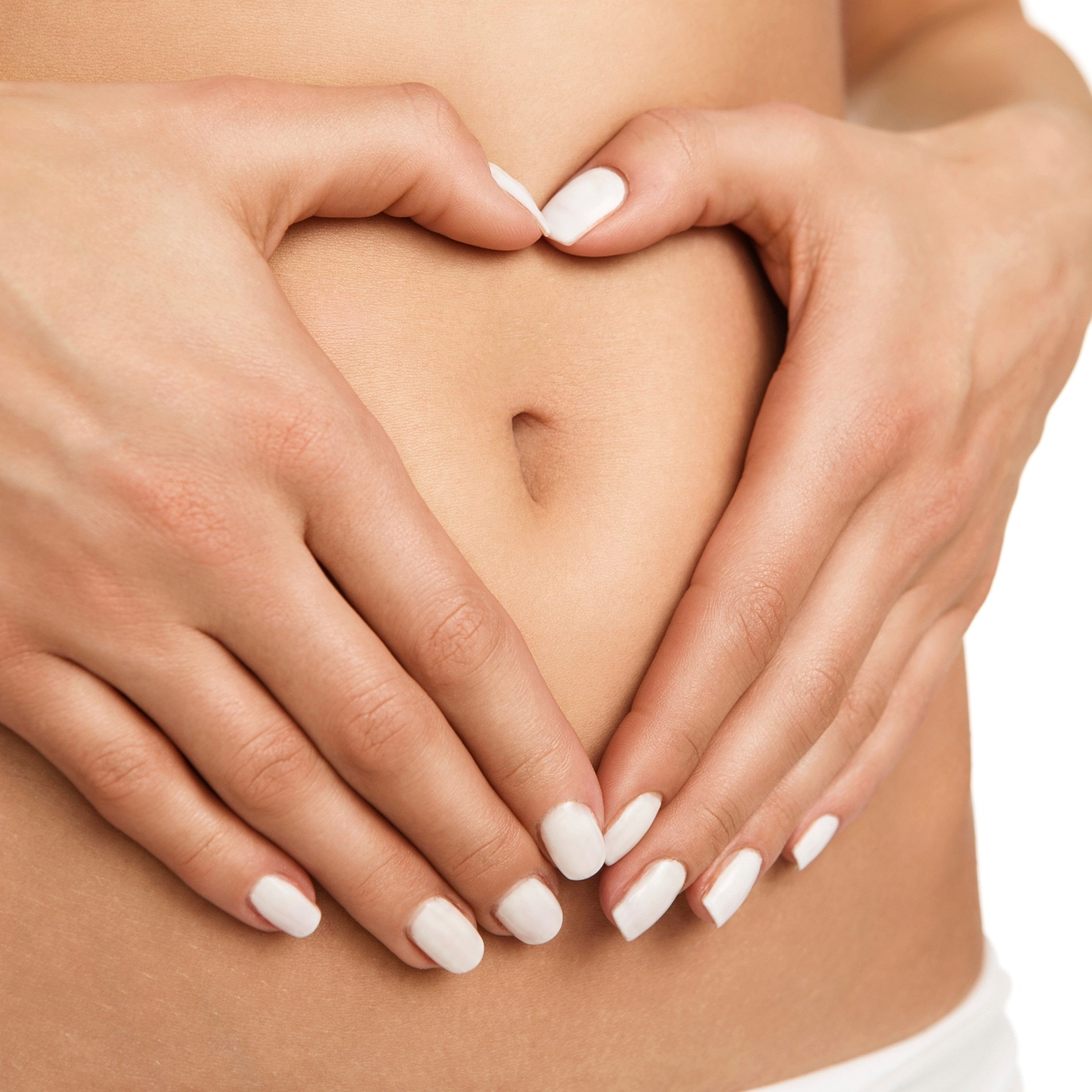Natural Remedies for Bloating
Every April is IBS (Irritable Bowel Syndrome) awareness month and bloating is one of the most common complaints from people who suffer with IBS. Ongoing symptoms of gas and bloating can leave you feeling uncomfortable, tired and less productive at work. To read more on Irritable Bowel Syndrome, you may like to read ‘Natural Remedies for IBS’ by Nutritional Therapist Camilla Gray.
This article looks at some simple tips and remedies you can implement to beat the bloat this month and beyond.
What causes bloating in the stomach?
The production of gas is a normal process but it can become uncomfortable and embarrassing after meals when produced in excessive amounts. Bloating usually occurs when there is too much gas in the gut and is produced by bacteria digesting and fermenting our meals. Some of the key causes of bloating are: stress, food intolerances, constipation, overeating, dysbiosis, increased intestinal permeability, low stomach acid, infections, high sugar diet, eating too quickly, and hormonal imbalances. Read our article: Stress and bloating: can one cause the other? to learn more.
How do I get rid of gas and bloating fast?
Diet and lifestyle changes can play a key part in reducing gas and bloating. Current research indicates that by supporting gut motility, gut microbiome, gut sensitivities, and dietary intake, we can relieve this common functional gut problem7.
The link between diet, lifestyle and gut health is highlighted by the fact that the prevalence of IBS is much higher in Western society compared with other parts of the world8. In general, a modern day 'Western diet' contains high levels of trans and saturated fats, high sugar levels and too little fibre, all of which contribute towards gut health symptoms.
Could our lifestyles be the key to a calmer happier microbiome?
What are the best natural approaches to beat bloating?
- Practice mindful eating
- Plant based herbs and compounds
- Try the low-FODMAP diet
- Fibre
- Gas Producing Foods
- Probiotics
- Leaky gut
- Hydration
- Breathwork
- Movement
- Food triggers
- Balance your hormones
- Stress Management
The following natural approaches consist of simple diet and lifestyle changes that can be implemented to promote better gut health.
Practice mindful eating
How, what, and when we eat has a huge effect on the health of the gut. A mindful approach to eating includes eating smaller meals, not eating too fast, and not rushing your meals. Gulping your food down and talking whilst eating can introduce more gas in to the system as you swallow. Eating food without proper chewing can also impair digestion, and put strain on the digestive system. Avoid drinking beverages immediately before or after eating as this can dilute your stomach acid, affecting your overall digestive capacity.
Plant based herbs and compounds
Certain herbs and spices have been shown to help relieve bloating including:
- Turmeric (curcumin)
- Berberine
- Caraway
- Ginger (gingerols)
- Black cumin
- Dill
- Thyme
- Parsley
- Spearmint9
Try adding some of these herbs in to your meals or infuse with hot water and drink as a tea. Not only will they soothe the digestive tract, but they also taste delicious!
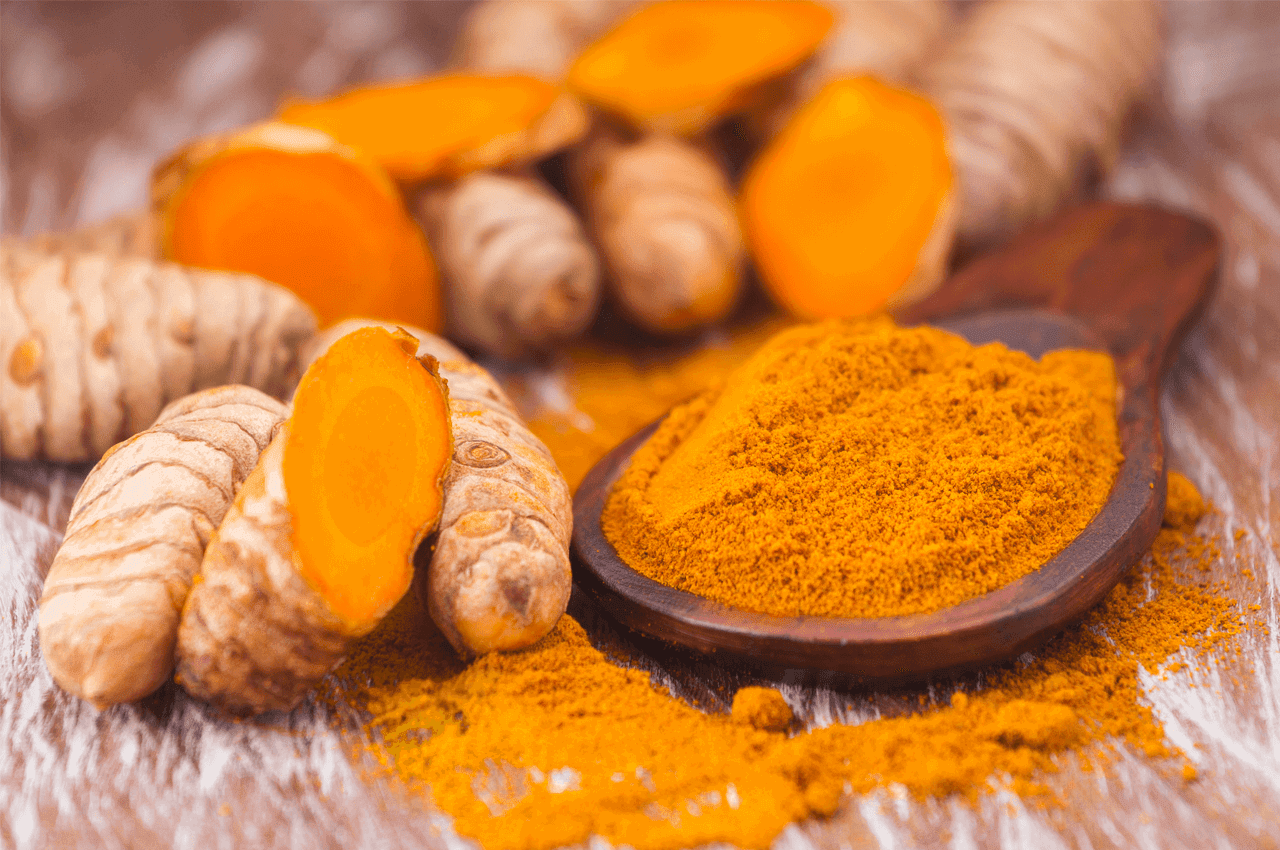
Try the low-FODMAP diet
The low-FODMAP diet contains more easily digestible foods and reduces certain carbohydrates that can be poorly absorbed, leading to fermentation in the small intestine. This elimination diet is increasing in popularity and can help in the short term, allowing the gut to heal. In the longer term you need to establish a tolerance level for each food, in order to reintroduce it and keep your diet as diverse as possible. Learn more about the low-FODMAP diet.
Fibre
Talk to a nutritionist about your fibre intake. Fibre is needed to maintain regularity and prevent constipation which can contribute to bloating. Insoluble fibre will become your new best friend if your bloating is being caused by irregular bowel movements or constipation. Raw plant foods are fibre rich but can be more difficult to digest so stick to cooked foods whilst on any gut healing program. Find out more: Are you eating enough fibre?
Prebiotics are a type of fibre, found in certain fruits and vegetables, that selectively feed the friendly bacteria residing in our gut. Nutritional Therapist Kerry Beeson explains more about prebiotics here in her article ‘What are prebiotics?’. Ensuring your diet contains an adequate amount of prebiotics will also help manage bloating, so try including foods such as bananas, leeks, asparagus, artichoke, and onions. This will help to increase the diversity and number of friendly bacteria in your gut.
Optibac Probiotics One Week Flat is a good source of the prebiotic, FOS (fructooligosaccharides), as well as probiotic bacteria.
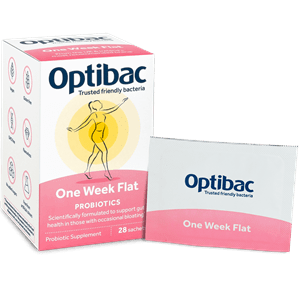
Gas Producing Foods
Beans, pulses, and lentils are an excellent source of plant based nutrition but are renowned for being gassy foods alongside other vegetables such as the brassicas. However these foods do not need to be removed from the diet if you prepare them properly. You can build tolerance by eating them in moderation and allowing your gut bacteria to adapt - our gut bacteria colonies change according to what we eat.
It is important to soak beans and legumes overnight for 12 hours, and discard the soak water, to reduce the gas producing potential to bloat. You can also try adding the seaweed Kombu whilst cooking them, as this makes them easier to digest. Pathogenic bacteria thrive on sugar so reducing your intake of high carbohydrate and sugary foods will help to prevent fermentation in your gut.
Probiotics
Our gut microbiome consists of an ecosystem of microorganisms that outnumber the amount of human cells in our bodies10. Our microbial ecosystem is essential for maintaining normal gastrointestinal function and is directly influenced by our diet and lifestyle choices. Learn more about our gut microbiota by reading: All About The Microbiome.
Certain strains of probiotics have been shown to reduce symptoms of IBS and bloating. You may like to read the article: Which probiotics are for IBS?. When choosing a supplement it is worth spending some time to find quality strains that have good clinical evidence behind them11. A compromised microbiome with an imbalance of good and bad bacteria may result in gut complaints, so by introducing a probiotic supplement we can support a healthier balance of microbes and reduce symptoms of gas and bloating.
If you experience frequent bloating then a probiotic supplement may help by introducing more friendly bacteria such as Lactobacillus and Bifidobacteria, and more specifically strains such as Lactobacillus acidophilus NCFM® that has been shown to reduce bloating and other IBS symptoms.
Lactobacillus acidophilus NCFM® can be found in Optibac Probiotics Every Day EXTRA. Healthcare professionals can read more about Lactobacillus Acidophilus NCFM® on the Probiotics Database.
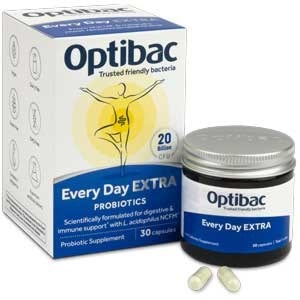
Leaky gut
Heal your gut with nourishing foods that promote a good balance of bacteria in your microbiome. Having a healthy microbiome helps reduce inflammation in the gut, which keeps your gut lining healthy, and therefore prevents undigested food from passing into your bloodstream.
Fruits and vegetables contain fibre which are needed by our gut bacteria to support the production of short-chain fatty acids (SCFAs). These SCFAs are important in maintaining the integrity of the gut lining, regulating immunity, and supporting gut-brain-axis communication12. Healing foods to consider include:
- Fibre rich fruits and vegetables, such as: papaya, pineapple, leeks, jerusalem artichokes, fennel, chicory, cabbage, bitter greens and bananas
- Foods rich with live cultures, such as: live yoghurt, kombucha, sauerkraut and bone broth
- Herbs and spices, such as: mint, ginger and chamomile
- Healthy fats, found in: oily fish, flaxseed, olive oil and avocados
Hydration
Staying well hydrated with water and digestive herbal teas such as fennel, ginger, lemon, and peppermint will support the movement of food through the digestive tract. Avoid drinking large quantities close to food however, so as not to dilute your digestive juices. Reducing sugary and carbonated beverages will also help to reduce gas in the intestine.
Breathwork
Manage your stress and support digestion by practicing focused breathing exercises before meals. Diaphragmatic breath work activates your parasympathetic nervous system which enables your body to ‘rest and digest’. Many people are stuck in sympathetic (‘fight or flight’) mode as we lead increasingly more stressful lives, and this hinders our digestive capacity. BREATHE in for 5 and out for 10 for 3 rounds before eating your meals.
Movement
Regular exercise and short walks after meals can aid digestion. Yoga can also be very good if your bloating is linked to stress and anxiety.
Food triggers
Avoid foods that you intuitively feel are making your symptoms worse. If you're not sure which foods these are then it may be beneficial to keep a food diary to track symptoms, and identify triggering foods. Some of the most common triggers for bloating include: gluten, dairy, spicy foods, fried foods, refined sugars, beans, brassicas, and alcohol.
Balance your hormones
Hormone imbalances can trigger bloating, and many women notice that the symptom is worse around their period. Hormones have a big impact on our gut bacteria (and also our vaginal bacteria), which is one of the reasons why some women bloat pre-menstrually. Other conditions linked to hormone imbalances are: Polycystic Ovary Syndrome (PCOS), fibroids, endometriosis, and irregular periods.
Diet and lifestyle measures can be taken to help balance hormones naturally. Balancing foods include flaxseed, chia, pumpkin/sunflower seeds, healthy fats, and liver supportive foods such as lemon, leafy greens, bitter herbs, and milk thistle. You may also like to read: Supplements for women - which do you really need?
Stress Management
Stress aggravates bowel symptoms so it is important to return to daily practices that bring about a sense of calm for you. Plug in to resources that keep your stress levels down and your nervous system in ‘rest and digest’ mode. Emotional resilience will positively influence your gut health and can include activities such as walks in nature, breath work, alone time, exercise, yoga, healthy food choices, and good social connections.
If your bloating is ongoing and occurs with other symptoms you should talk to your doctor to about the best way to manage it and to determine the underlying cause.
Want to read more?
Probiotics for Bloating
Probiotics for IBS
References
- Gastroenterology & Hepatology, Millenium Medical Publishing. Management Strategies for Abdominal Bloating and Distension. Anna Foley, MBBS, FRACP, Rebecca Burgell, MBBS, FRACP, Peter R. Gibson, MD, FRACP, 2014.
- Journal of Neurogastroenterology and Motility. The Role of Visceral Hypersensitivity in Irritable Bowel Syndrome: Pharmacological Targets and Novel Treatments. Mohammad H Farzaei, Roodabeh Bahramsoltani. Oct 2016.
- Iranian Red Crescent Medical Journal. Kowsar Medical Institute. Prevention and Treatment of Flatulence From a Traditional Persian Medicine Perspective. Bagher Larijani, Mohammad Medhi Esfahani, Arman Zargaran. Apr 2016.
- Journal of Neurogastroenterology and Motility. The Role of Visceral Hypersensitivity in Irritable Bowel Syndrome: Pharmacological Targets and Novel Treatments. Mohammad H Farzaei, Roodabeh Bahramsoltani. Oct 2016.
- Williams EA1, Stimpson J, Wang D, Plummer S, Garaiova I, Barker ME, Corfe BM.. (2009). Clinical trial: a multistrain probiotic preparation significantly reduces symptoms of irritable bowel syndrome in a double-blind placebo-controlled study. Alimentary pharmacology and therapeutics. 29 (1), 97-103.
- Frontiers in Endocrinology. The Role of Short-Chain Fatty Acids From Gut Microbiota in Gut-Brain Communication. Ygor Parladore Silva, Andressa Bernardi, and Rudimar Luiz Frozz. 2020.
- https://www.ncbi.nlm.nih.gov/pmc/articles/PMC4991532/
- https://www.ncbi.nlm.nih.gov/pmc/articles/PMC5056566/
- https://www.ncbi.nlm.nih.gov/pmc/articles/PMC4893422/
- https://www.ncbi.nlm.nih.gov/pmc/articles/PMC5056566/.
- Williams EA1, Stimpson J, Wang D, Plummer S, Garaiova I, Barker ME, Corfe BM.. (2009). Clinical trial: a multistrain probiotic preparation significantly reduces symptoms of irritable bowel syndrome in a double-blind placebo-controlled study.. Alimentary pharmacology and therapeutics. 29 (1), 97-103.
- https://www.ncbi.nlm.nih.gov/pmc/articles/PMC7005631/
Popular Articles
View all Gut Health articles-
Gut Health02 Nov 2023
-
Gut Health04 Sep 2024
